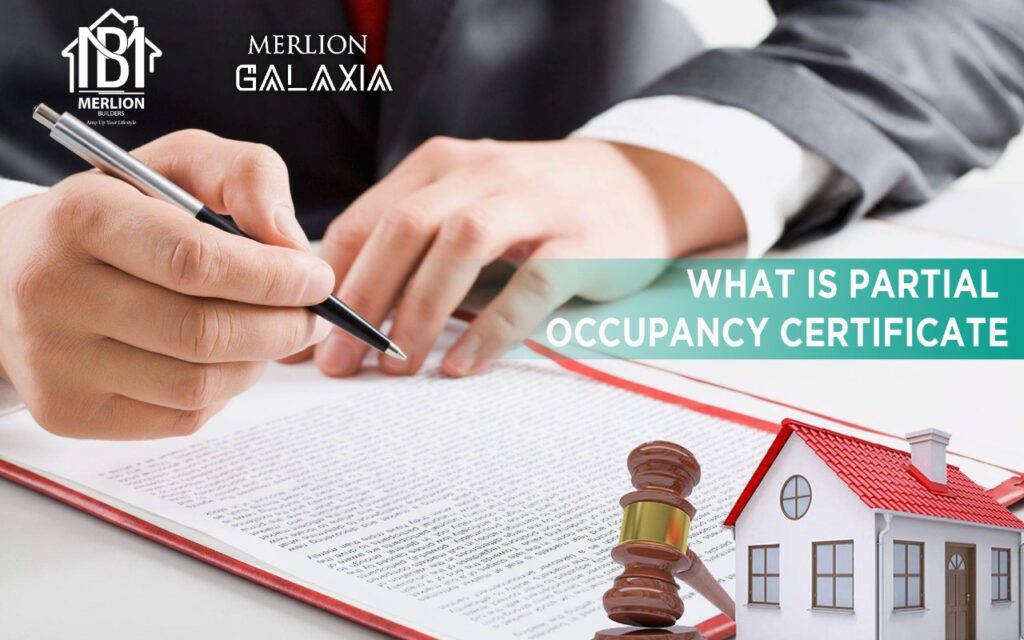
What is Partial Occupancy Certificate?
When you are out to shop a property, you come across various terms, out of which, some are familiar to us and some sound strange. One such unfamiliar word is Partial Occupancy Certificate. This sounds similar to Occupancy Certificate but both are not the same. Let’s gather more information on Partial Occupancy Certificate.
1. Know About Occupancy Certificate
One has to be well versed with civic, legal, technical and financial aspects of real estate before investing in an under-construction or ready-to-move-in property. A buyer should not occupy a unit in a housing project before the project gets an occupancy certificate. This certificate certifies that the building is completed and is ready to be used in all aspects. It also approves that the construction is as per the approved plan and in compliance with the local laws. Hence, it is also known as Completion certificate. The municipality or the local body of the area issues the Occupancy Certificate. A builder has no right to give the possession of the house to the owner until he acquires the Occupancy Certificate. Usually a buyer is concerned about the documents and legal procedures related to the purchase of a new property and hardly bothers about the Occupancy Certificate which is of considerable importance. Absence of Occupancy Certificate proclaims that the building is not constructed as per the local laws and set standards and hence is not fit for use. There are chances of it being demolished for being an unauthorized structure in future. An Occupancy Certificate gives the builder the right to allow the buyers to occupy the premises and this certificate is mandatory for any building which has more than five units. Therefore an Occupancy Certificate certifies that the building is constructed as per the norms and standard of the local laws.
2. What is Partial Occupancy Certificate
If a housing project comprises of a large- scale development, it is built in phases. When a part of the project is completed, the developer can obtain a Partial Occupancy Certificate from the local authorities, for that particular phase and then give possession to the buyers. Suppose, a builder has eight towers in his project, he can complete one tower and then apply for Partial Occupancy Certificate. This Certificate gives him the authority to give the possession of units to the buyers in that fully constructed tower. A buyer can occupy a unit which has received a Partial Occupancy Certificate, though it does not have an Occupancy Certificate. Partial Occupancy Certificates are given to those projects that are developed in phases or blocks. It is mandatory for the developer or the builder to get an Occupancy Certificate after the completion of the entire project because the Partial Occupancy Certificate is valid until the entire project gets completed.
3. Factors Affected by Partial Occupancy Certificate
There are a few factors that might be affected due to the Partial Occupancy Certificate. A few are mentioned here.
3.1. Validity of Partial Occupancy Certificate
The Partial Occupancy Certificate does not have a long validity. It expires as soon as the entire project is completed. The builder is expected to complete the entire project within seven years of obtaining the first Partial Occupancy Certificate, for a part of his project. Once the project is completed, he has to apply for the Occupancy Certificate within a period of 30 days with the concerned authorities. As soon as he obtains an Occupancy Certificate, the Partial Occupancy Certificate expires. Getting a Partial Occupancy Certificate for one or two blocks of his project doesn’t guarantee that the developer will be able to get the Occupancy Certificate too because the entire building has to fulfil the set criteria. The buyers who get the possession due to the Partial Occupancy Certificate should closely monitor the
progress of the entire project and insist the developer to get an Occupancy Certificate immediately after the completion of the project.
3.2. Home Loan Becomes an Issue
Getting a home loan on the basis of Partial Occupancy Certificate is a difficult task because banks do not provide loans for a project that has only a Partial Occupancy Certificate unless the developer has a tie-up with the bank. If you are planning to get a fresh unit from the unsold units, remember to check that the builder has an Occupancy Certificate and not just a Partial Occupancy Certificate.
3.3. Ownership Documents and Possession
Using the Partial Occupancy Certificate, a person can apply for the utilities but cannot use it to get the ownership documents sanctioned. It will not help to prove your ownership of the property. One can get the possession of his unit with the Partial Occupancy Certificate and need not have to wait till the completion of the entire project. One should always take care of the fact that the unit in the completed block or tower is fit for living and is inhabitable. Never take the possession of a unit if it is uninhabitable. Rather you can also bring this fact to the notice of the Real Estate Regulatory Authority of your state. One should also get access to common facilities, though the project is partially completed.
4. Pre-requisite for Partial Occupancy Certificate
With the growing trend of multi- tower projects, many builders are taking up the construction activity in phases. A builder or a developer can apply for a Partial Occupancy Certificate when a phase is completed. Similarly he can keep applying for every phase on its completion. Once the entire project is completed, then he has to get an Occupancy Certificate for the entire project and the so far obtained Partial Occupancy Certificates for various phases expire, the moment he gets the Occupancy Certificate.
A builder can apply for a PartialOccupancyCertificate for the completed phase of his project within a period of 30 days after completion. A PartialOccupancyCertificate requires a clearance from the fire department. It should also meet requirements for waste management areas and composting facilities. Rainwater harvesting facilities and sewage treatment plant should be available. It also needs a clearance from the Airports Authority of India if the property falls within the range of an airport. It is mandatory to get a clearance from the electrical inspector. As is the rule, only the basement and ground floor must be used for parking vehicles
